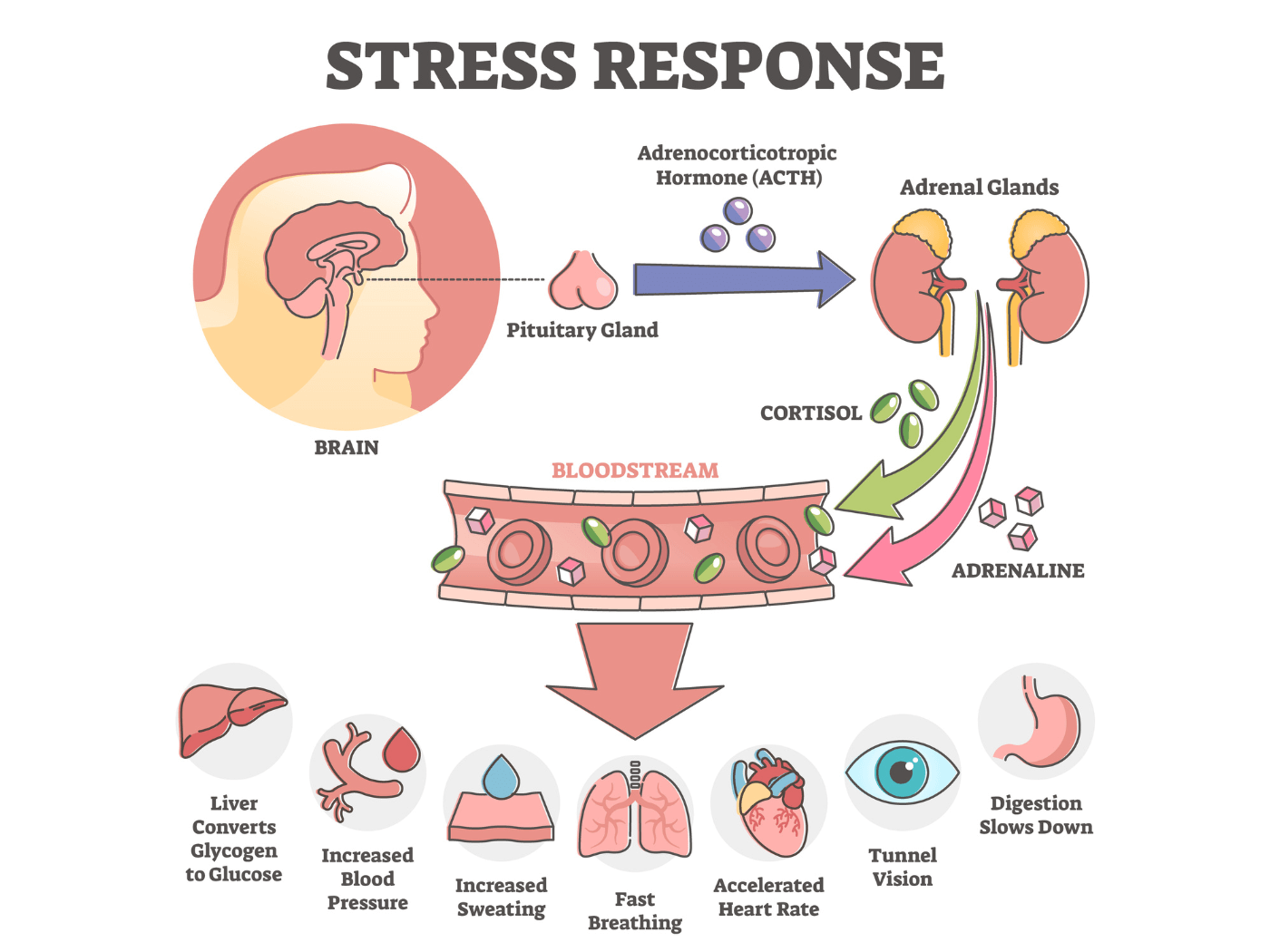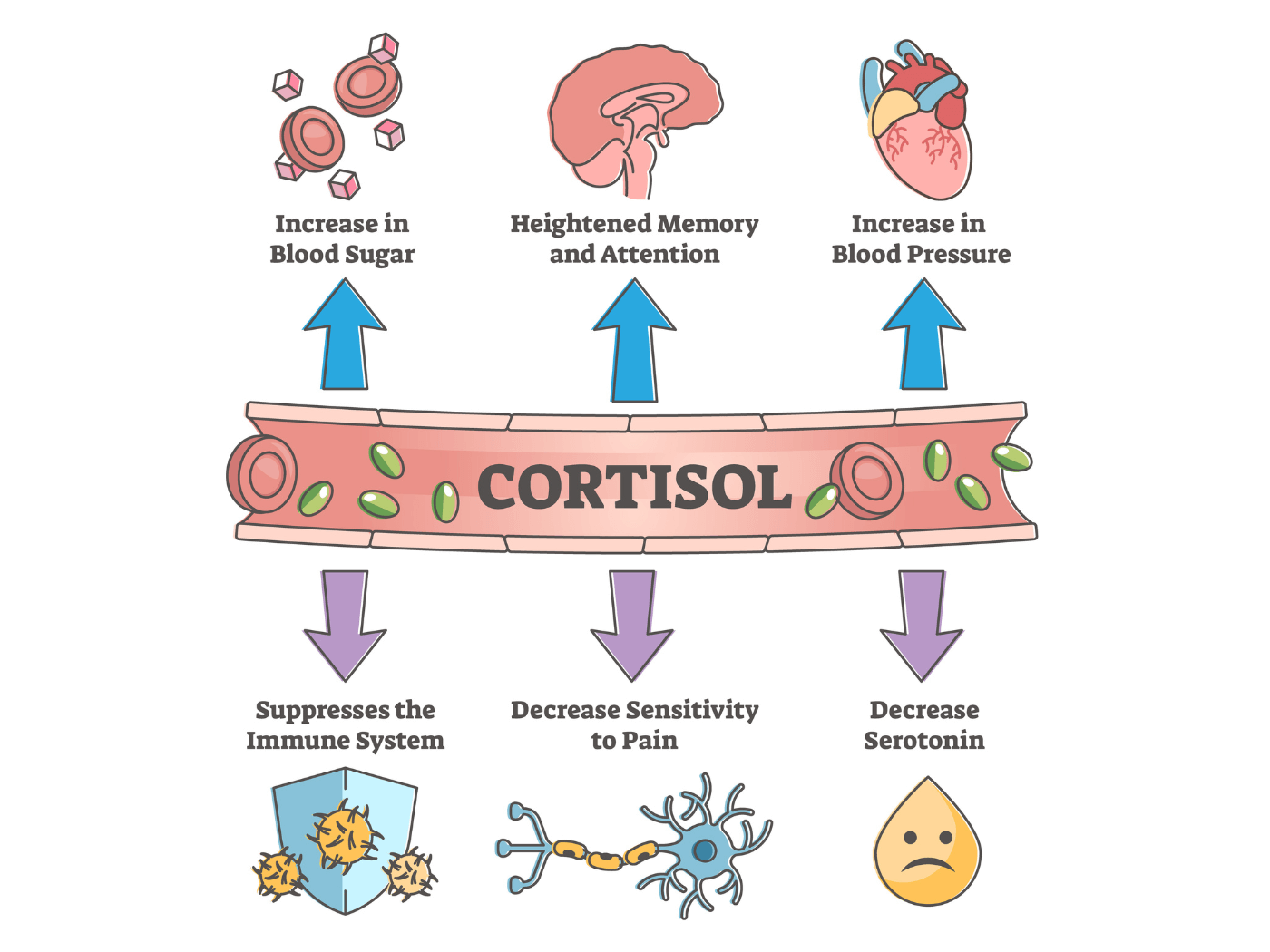You’ve probably heard that stress is bad for your health. But how bad, exactly? And what can you do to reduce your stress levels when you’re stuck in a tense situation?
Every day, you’re exposed to dozens of stressors. Disagreements with your partner. A massive workload at the office. Drama with family and friends. These moments build up, leading your body to produce high cortisol levels.
In this blog, we’ll explore how cortisol impacts various organs in the body, as well as tips you can follow to reduce stress regardless of how hectic your life may be.

What Is Cortisol, Exactly?
To your body, stress is one thing: a perceived threat. In the past, threats were a lot more dangerous and deadly than they are today. But whether you’re being chased by a wild animal or stuck in a traffic jam, your body helps you get through the situation the same way: by stimulating the production of cortisol.
Cortisol, a steroid hormone, is produced by the adrenal glands located on the kidneys. It’s often referred to as the “stress hormone.” When you experience stress, cortisol helps boost your energy levels by increasing glucose availability. It allows your body to prioritize the physiological systems essential to getting you out of the stressful situation, while reducing the efficiency of less essential systems like your digestive system, immune system, and reproductive system.
Cortisol isn’t just released during high-pressure situations. Our body naturally produces cortisol throughout the day to help regulate the sleep-wake cycle. It plays a vital role in your metabolism, blood pressure, and cardiovascular function. It’s present in almost every tissue in the body and impacts every organ system, from your brain to your lungs.
Unfortunately, too much cortisol can lead to a number of long-term health problems. Many of these could reduce your life expectancy as well as decrease your quality of life. Cortisol needs to be kept in balance, or it can disrupt your weight, muscle function, and blood sugar levels.

How Does Cortisol Impact The Body?
As mentioned above, cortisol impacts just about every part of your body. However, its main function is to help you navigate a stressful situation. It does this by:
1. Increasing Energy Levels
Cortisol promotes gluconeogenesis, where the body pulls glucose from non-carbohydrate sources like protein. This extra glucose provides a temporary boost of energy, increases your metabolic rate, and helps you focus better. While these benefits sound great, they often include many unwanted (and harmful) side effects, as we describe below.
2. Boosts Fat Storage
When you experience chronic or long-term stress, cortisol stimulates your body to store more fat by increasing insulin resistance. Not only does this increase your risk of diabetes, but it also leads to more fat accumulation, especially around the abdomen.
3. Breaks Down Muscles
One of the places your body stores protein is, of course, the muscles. The gluconeogenesis stimulated by cortisol breaks down muscle tissue into amino acids, which then can be converted into glucose.
Unfortunately, this doesn’t just reduce your muscle composition. It also slows your metabolic rate. Muscle tissue burns more calories at rest than fat tissue, so the less muscle you have, the less fat you’ll be able to burn off without exercise.

4. Reduces Thyroid Function
Thyroid hormones are essential for regulating your weight. Unfortunately, cortisol is believed to suppress the production and activity of thyroid hormones, including:
- Reducing enzyme 5’-deiodinase, the enzyme that converts T4 to T3, which then leads to less availability of T3 hormones to be used by your cells.
- Causing the thyroid gland to produce fewer thyroid hormones naturally by influencing the release of thyrotropin-stimulating hormone (TSH) from the pituitary gland.
- Increasing the risk of the development of hypothyroidism or hyperthyroidism, particularly in cases of long-term stress.
- Influencing the immune response of thyroid antigens, which can lead to the progression of autoimmune thyroid diseases like Grave’s disease and Hashimoto’s disease.
5. Increasing Your Appetite
You need a lot of carbs to maintain gluconeogenesis. As a result, cortisol often stimulates appetite and makes you crave high-calorie, high-sugar, high-fat foods. This naturally leads to more weight gain and energy expenditure, further reducing your metabolism.
6. Raises Your Blood Pressure
An important role cortisol plays is managing your blood pressure levels. However, elevated cortisol levels lead to hypertension (high blood pressure levels). This can cause damage to blood vessels and raise your risk of cardiovascular diseases, as well as strokes and aneurysms.
7. Speeds Up Cellular Aging
High cortisol levels accelerate the shortening of telomeres, the protective ends of genetic chromosomes. By speeding up the degeneration of telomeres, cortisol can lead to increased fine lines and wrinkles, as well as age-related diseases like certain cancers.

How To Reduce Your Cortisol Levels
Chronically high cortisol levels aren’t just a reflection of a stressful life. They’re also a contributing factor to weight gain, thyroid disease, insulin resistance, and metabolic dysfunction. As a result, reducing stress as much as possible is essential for maintaining a healthy, fulfilling life.
Ideally, if you know a situation is causing you severe emotional or physical stress, the best-case scenario is to change. This may mean finding a slower-paced job, limiting contact with certain friends or family members, or ending a relationship.
Whether you’re stuck in a stressful situation, battling health problems, or worried about loved ones, these tips will help you reduce the amount of cortisol your body produces on a daily basis:
- Meet with a good therapist: Regular therapy sessions are an excellent way to de-stress, learn better coping skills for the problems in your life, and prioritize your mental health. If you don’t know where to start, Psychology Today has listings for dozens of therapists and psychologists in the DFW area.
- Get more sleep. Not getting enough sleep on its own can cause higher cortisol levels. Plus, being exhausted limits your ability to make the best decisions when in stressful situations, which can expand your stress further. Check out this blog for tips on how to get more high-quality shut-eye.
- Don’t forget to exercise. Regular physical activity has been proven to reduce stress, lower cortisol levels, improve sleep, and boost overall mood. And the best news? You don’t need to spend an hour at the gym every day to enjoy these benefits. Just a 10-minute daily walk or a 30-minute workout 3 times a week can make a huge difference.
- Practice deep breathing. When you find yourself feeling overwhelmed, take a few minutes to practice some breathing exercises. Controlled breathing has been shown to stimulate your parasympathetic nervous system and decrease cortisol levels. Start with box breathing, where you slowly breathe in for 4 counts, hold for 4 counts, and breathe out for 4 counts.
- Do yoga or tai chi. These exercises not only help get you moving but also reduce stress by regulating the autonomic nervous system and hypothalamic-pituitary axis. For those new to yoga or tai chi, YouTube offers free videos for beginners. Consider starting your day with a quick 15-minute session or dedicating half an hour on Saturday and Sunday to de-stress.
- Laugh often. Laughing helps promote the release of endorphins and suppresses the release of cortisol. Try listening to comedy routines after work, watching comedy movies, or spending time with people in your life who make you laugh.

Don’t Let Cortisol Impair Your Health & Quality Of Life
Stress is a natural part of life. However, long-term stress can result in a number of health issues due to excess cortisol levels, speeding up the aging process and preventing you from living your best life.
One of the best ways to determine whether chronic stress has made an impact on your health is with a breath analysis. Breath analysis is currently the only method known to science to reliably measure your aerobic metabolism, VO2 max, metabolic rate, and fat-burn capability.
In just 10 minutes, a breath analysis will show you:
- Your biological age, which is one of the strongest predictors of morbidity risk
- How efficiently your body burns calories from carbs and fat
- How much fat, carbohydrates, protein, and calories you need daily to lose weight
- Your ideal training zone to lose weight and lower your biological age
At The Resurge Clinic, a breath analysis is just one of the ways we’ll help you identify the damage chronic stress may be causing to your body, create a customized plan to reduce stress and lose weight, and feel like your best self every day.
If you live in the DFW area, schedule a consultation now to get started.



